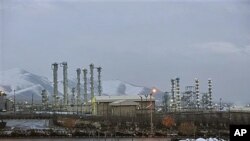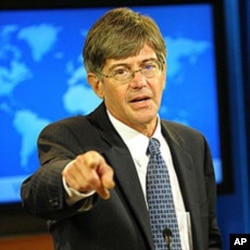The United States has announced sanctions against seven foreign entities, including Venezuela’s state oil company, for engaging in trade with Iran in violation of U.S. law. It is part of an effort to prompt Iran to return to big-power talks over its nuclear program.
The Obama administration is stepping up its sanctions against foreign companies aiding Iran’s energy sector following a disappointing Iranian response to the latest big-power offer to return to nuclear talks.
A State Department announcement said seven companies, among them the Venezuelan state oil company Petroleos de Venezuela, will face varying penalties for helping deliver refined oil products to Iran.
The others cited under the 1996 Iran Sanctions Act from the U.S. Congress are two firms based in the United Arab Emirates, and one each in Britain, Singapore, Monaco and Israel.
Despite its vast crude-oil resources, Iran has been dealing with a chronic shortage of gasoline and other refined oil products. The Obama administration has focused sanctions efforts on Iranian fuel imports as a way to exploit that vulnerability and boost pressure on the nuclear issue.
At a news briefing, Deputy Secretary of State James Steinberg cited reports that Iranian fuel imports may have dropped by 60 percent as would-be suppliers realize that with potential sanctions, the risk of doing business with Iran is just too high.
“By imposing these sanctions, we are sending a clear message to companies around the world. Those who continue to irresponsibly support Iran’s energy sector, or help facilitate Iran’s efforts to evade U.S. sanctions, will face significant consequences,” he said.
The last round of talks between Iran and the five permanent U.N. Security Council member states and Germany, the P5+1, was held in Istanbul in January.
The major powers, offering incentives to Iran to end its uranium-enrichment program, have proposed further talks provided Tehran is ready to deal seriously on the nuclear issue.
U.S. and European officials believe the enrichment drive is weapons related, although Iran denies nuclear weapons ambitions.
Steinberg said the latest Iranian note on the issue, delivered earlier this month to European Union chief diplomat Catherine Ashton, was “not responsive” to big-power concerns.
“The core is a real commitment for them to address the nuclear program and we did not see that in the letter that was sent to Cathy Ashton," he said. "So it is very clear that is why we are continuing to pursue these measures both by ourselves and with others, because I think we need to continue to keep the pressure on Iran. These clearly had an impact on their economy. At what point that will cause them to make different decisions obviously is something we have to watch carefully.”
The U.S. announcement came a day after the European Union expanded Iran sanctions, action the Tehran government said was contradictory to the bloc's stated desire for dialogue.
In a separate move, the State Department says it is sanctioning 16 foreign companies and individuals under the 2000 Iran, North Korea and Syria Non-Proliferation Act, which is aimed at curbing weapons of mass-destruction programs of the three countries.
That action bars U.S. business dealings or aid for at least two years to the named firms or persons from Iran, North Korea, Syria, China, Belarus and Venezuela.





